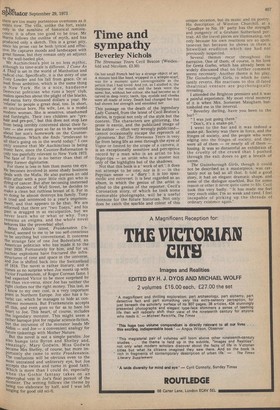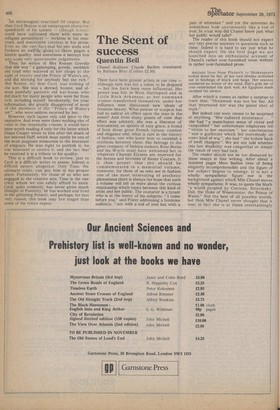Time and sympathy
Beverley Nichols
The Strenuous Years Cecil Beaton (Weidenfeld and Nicolson, £3.50)
On her small French bed lay a strange object of art. A minute bird-like head, wrapped in a wimple-scarf, was for a moment quite unrecognisable as the person that I had loved. And yet, as I studied it, the sharpness of the mouth and the beak were the same; but, without her colour, she had become as if carved in deep ivory; teeth, lips, eyelids and cheeks were all made of ivory. Death had changed her but had shown her strength and ennobled her.
This passage on the death of the legendary Lady Cunard, from the latest of Cecil Beaton's diaries, is typical not only of the style but the Content. The characters are glittering, the prose is exotic, and the publicized image of the author — often very wrongly publicized— cannot occasionally escape the reproach of 'glossiness.' But The Strenuous Years is very far from being life as seen through the eyes of Vogue or limited by the scope of a camera; it is an exceptionally sensitive and perceptive record by a man who is an artist to his finger-tips — an artist who is a master not only of the highlights but of the shadows.
Not that this book is a work of art '; it does not attempt to be one; nor is it — in the Pepysian sense — a diary ': it is too spasmodic and extrovert. It is best regarded as an album, in which the genius of the artist is allied to the genius of the reporter. Cecil's Coronation story, of which he took some memorable photographs, will be a useful footnote for the future historian. Not only does he catch the sparkle and colour of this unique occasion, but its music and its poetry. His description of Winston Churchill, at a 'Goodbye to No. 10' party has the strength and pungency of a Graham Sutherland portrait. All the travel pieces are illuminating, not only because his own reactions are so spontaneous but because he shows in them a Sitwellian erudition which one had not previously suspected.
Several themes recur throughout the narrative. One of them, of course, is his love for Greta Garbo, which has already been so widely discussed that no further comment seems necessary. Another theme is his play, The Gainsborough Girls, to which he constantly reverts. His reactions to this ill-fated theatrical venture are psychologically revealing.
I attended the Brighton premiere and it was a painful experience. My most vivid memory of it is when Mrs. Somerset Maugham buttonholed me in the interval.
"Beverley darling, have you been to the bar?"
"I was just going there."
" Don't, it's a snake-pit."
I went to the bar and it was indeed a snake-pit. Society was there in force, and the fringes of society, and the people who were edging into the fringes of society, and they were all of them — or nearly all of them — hissing. It was so distasteful an exhibition of the cruelty of the crowd that I pushed through the exit doors to get a breath of ozone.
The Gainsborough Girls, though it could not be described as a masterpiece, was certainly not as bad as all that. It told a good story, it had an elegant dramatic shape, and some of the dialogue sparkled. But for some reason or other it never quite came to life. Cecil took this very badly. "It has made me feel very much older. I'm so weak and tired. I feel incapable of picking up the threads of ordinary existence again." —An extravagant reaction? Of course. But then Cecil Beaton is an extravagant character. spendthrift of his talents — (though nobody could have cultivated them with more intelligent persistence) — reckless in his emotions, and sometimes careless in his prose. Even so. the very fact that his pen stabs and flickers so swiftly gives to these pages a kinetic quality. And sometimes it betrays him into some very questionable judgements.
Thus, he writes of Mrs Ronnie Greville that she was "a galumping, greedy, snobbish old toad who watered at her chops at the sight of royalty and the Prince of Wales's set„ and did nothing for anybody but the rich." Mrs Ronnie, my dear Cecil, was nothing of the sort. She was a shrewd, honest, and almost painfully patriotic old war-horse, who did much for many people who were far from rich, including myself. Incidentally, for your information, she greatly disapproved of most of the members of the " Prince of Wales's set ", who were seldom received by her.
However, such lapses only add spice to the narrative. And even were there nothing else of value in this remarkable volume, it would have been worth reading if only for the letter which Diana Cooper wrote to him after the death of her beloved Duff, which must surely be one of the most poignant memorials in the literature of elegiacs. He was right to publish it; he was honoured to receive it; and the fact that' he received it is a tribute to his quality.
This is a difficult book to review, just as Cecil is a difficult writer to assess. Indeed, a difficult person altogether. Only Time, the ultimate critic, can put him in his proper place. Fortunately, for those of us who are engaged in the creative arts, Time is the one critic whom we can safely afford to snub. Cecil, quite evidently, has never given much thought to Posterity; he has worked and lived in the glittering Present, and perhaps, for that very reason, this book may live longer than some of his critics expect.











































 Previous page
Previous page